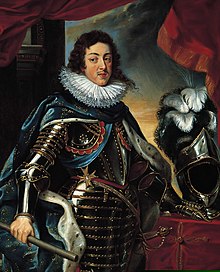This article needs additional citations for verification. (January 2020) |

Absolute monarchy in France slowly emerged in the 16th century and became firmly established during the 17th century. Absolute monarchy is a variation of the governmental form of monarchy in which the monarch holds supreme authority and where that authority is not restricted by any written laws, legislature, or customs. In France, Louis XIV was the most famous exemplar of absolute monarchy, with his court central to French political and cultural life during his reign. It ended in May 1789 during the French Revolution, when widespread social distress led to the convocation of the Estates-General, which was converted into a National Assembly in June 1789. The National Assembly passed a series of radical measures, including the abolition of feudalism, state control of the Catholic Church and extending the right to vote. The king of France was an absolute monarch.